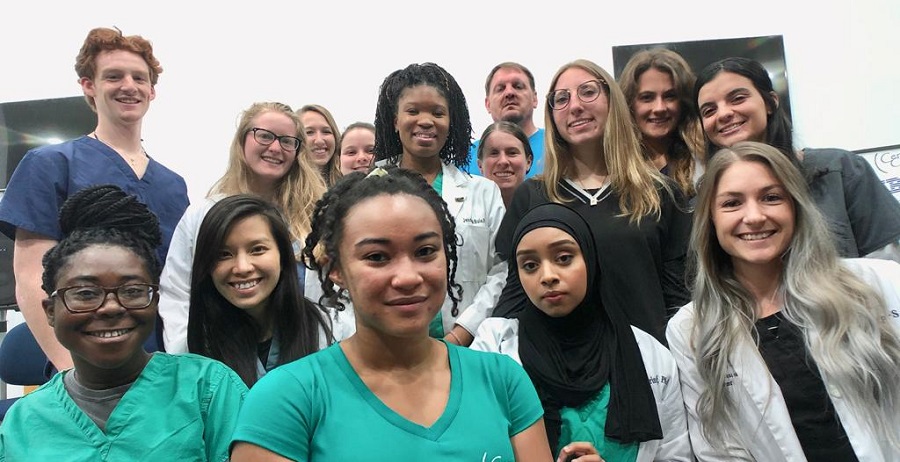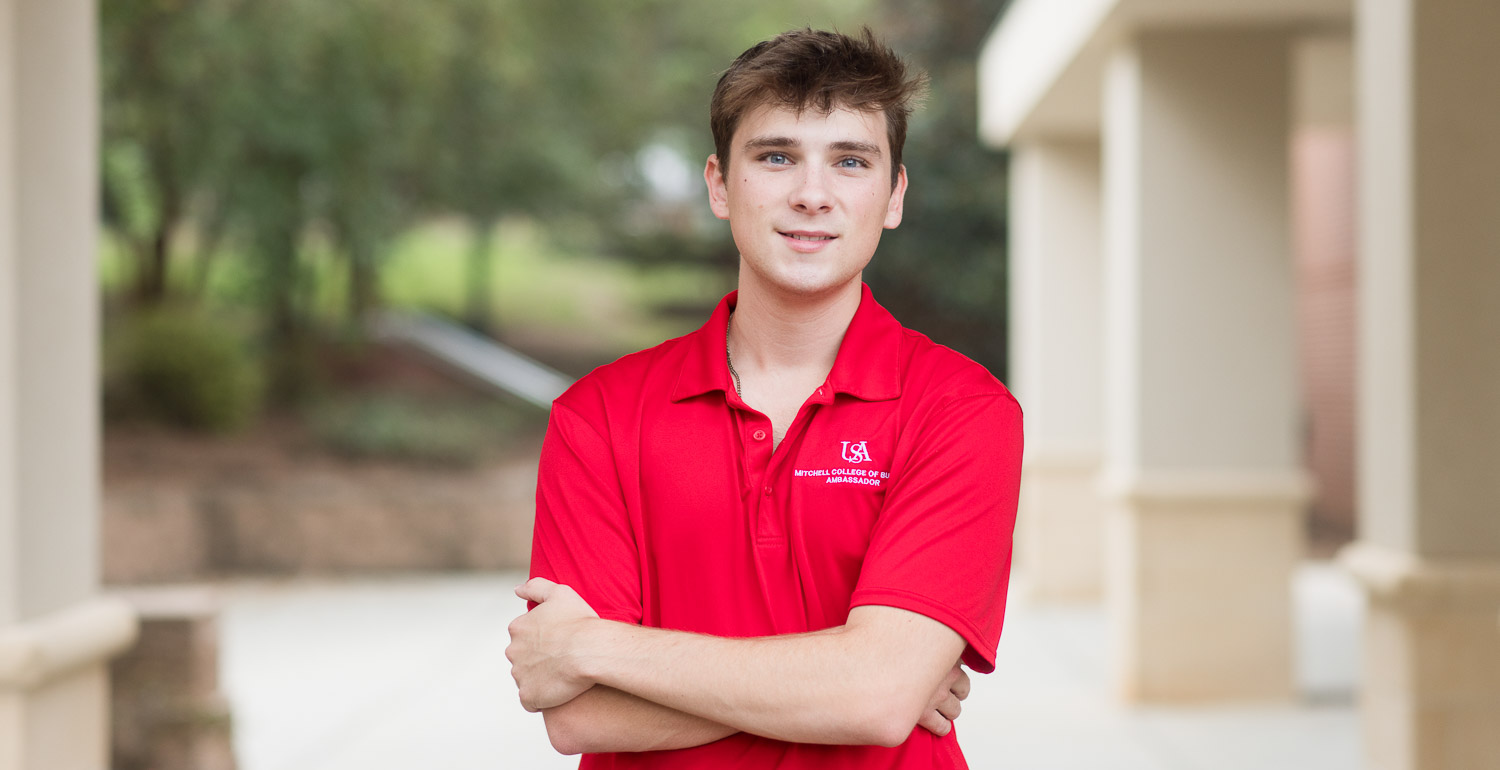A Pandemic, Card Games and a State Official Named 'Sunshine:' How USA Students Managed Quarantine, and Got Home from Peru
Posted on May 1, 2020

Near the end of a Study Abroad trip to Peru, with the threat of a coronavirus pandemic looming and their flight already moved up, a group of University of South Alabama students made a side trip to the mountain ruins of Machu Picchu.
The real adventure began on the way back.
“One by one, we started getting e-mails from the State Department,” said Joel Ellzie, an instructor in the department of emergency medical services. “Peru was going to close its borders at midnight on Monday, March 16. We had tickets for a flight leaving Lima at 12:15 – 15 minutes after the deadline.”
The South students never made that plane, and it took eight days for most of them to finally return to the United States. The stranded Jaguars made national news, and President Donald Trump even mentioned their plight during a news conference.
For more than a week, University administrators counseled students and consoled parents. They lobbied government officials and answered media requests. They met daily to consider their options.
“We exhausted pretty much every idea that anybody had,” said Bri Ard, director of International Education. “We thought about waiting – originally, the travel ban was 14 days. We thought about routing them to Chile, getting them home that way. We thought about getting them on a bus to Lima, that was one of the original plans, but it was a 20-hour trip, so that didn’t work, either.
“We’d never seen anything quite like this. Usually, when countries are going into a state of emergency, you have more warning. You have more than 24 hours to get out.”
Laurel Collins was one of the South students based at a medical clinic in Cusco, a historic city in southeastern Peru. She didn’t know what to expect from quarantine in a foreign country. The first morning, she found out.
“Very eerie,” Collins said. “So quiet. No people walking around. We were like, this might actually be a thing.”
Allie Smith, a graduate student from South, was working on a marine science project in La Punta, a suburb of the capital. She was shocked at how quickly everything changed.
“I was a little scared, a little anxious about the whole situation,” Smith said. “I mean, I was in a foreign country during a pandemic. So I stayed in my hotel and kept in touch with my family and my adviser. I tried to do some work – that didn’t go so well. I played cards with some German friends and we did daily exercises. I went on Facebook and looked at the news.”
Fear and Frustration
Most of the South students were in Cusco. Six EMS and three physician assistant students worked side-by-side with Peruvian providers at clinics and hospitals in the city and surrounding mountainside, focusing on women’s healthcare needs.
Ellzie was the faculty advisor on the trip, and became the de facto leader of 15 students from South, Augusta State, University of Georgia and Lenoir-Rhyne University during the lockdown. He told them that they would be leaving the country as a group. No student left behind.
“We felt safe, we felt comfortable,” Ellzie said. “We were staying at CerviCusco, which has a five-story building, with second- and third-floor dorm rooms. We had food. We had kitchens. But you couldn’t go anywhere but the bank and the grocery store. When the Peruvians say they’re going on a lockdown, they mean it. This is Cusco, a city with maybe 400,000 people, and there was nothing going on. It was silent.”
Back in the United States, the families of students were making noise, contacting congressmen and putting pressure on the State Department to bring their children home.
Nick Lawkis, executive director of government relations for South, worked the phones and wrangled support. The University was ready to front the $150,000 to charter a 16-passenger Gulfstream jet out of Miami, but sending a plane into a country that had closed its borders proved difficult.
“We quickly got the entire congressional delegation involved to help sort this out,” Lawkis said. “For days, we had a charter plane in Miami ready to go, but they couldn’t get clearance to land. The Peruvian government was kind of putting its foot down. They wanted a repatriation flight to take their people home from the U.S., but there was no orchestrated effort for them to do that. So it was kind of a standoff for a hot minute.”
A Ray of Sunshine
Frustrations for Ard included a lack of communication with officials in Peru. For several days, the U.S. consulate in Cusco was closed.
“Finally, we got an embassy contact who could say, ‘This is what I have, this is what I know right now,’” she said. “Her name was Sunshine – Sunshine Ison – and she was the bright spot of my week.”
Every day in Mobile, there were South meetings with University leadership. Ard learned what she could and shared what she knew.
“I had some conversations with parents that were really hard,” she said. “They were all super-supportive, but very emotional. A lot of tears. You want to be able to tell them it’s all going to be OK, but I all I could do is explain the situation to them.”
In Cusco, students in groups of three were allowed to walk a half-mile to the local supermarket. In the evening, they prepared group meals. The daily routine was better than the daily disappointment.
“Every day, we’d hear that we might be going home tomorrow,” Collins said. “Then tomorrow would come, and it’d be no. A lot of ups and downs and emotions.”
Groups of students distracted themselves with rounds of a card game called mafia, which requires guesswork and deductions. Others passed the time with homework, crosswords and the Internet.
“There was Wifi in the dorms where we were staying, so we could watch movies on Netflix,” said Zach McCleery, an EMS student from South. “I remember we watched ‘The Emperor’s New Groove,’ the Disney movie. The main character is called Kuzco, like the city we were in. We thought it was all fun.”
‘We’re Going Home!’
Finally, on March 24, after a week of waiting, the South students in Cusco got some good news. The next morning, there were booked on a humanitarian flight from Peru to Miami. Regulations required them to sign promissory notes for the cost of the trip, which will be covered by Study Abroad scholarships.
“We were playing cards one night when we heard these girls screaming, ‘We’re going home! We’re going home!” McCleery said. “We all got e-mails saying we had to be at the airport at 8:30 the next morning. All that night we packed and got everything ready.”
Ellzie remembers those screams, too. “Mass hysteria,” he said. He couldn’t sleep that night because he wanted to make sure everyone got up early for the trip home.
The EMS students clapped and cheered when they landed in Miami. It was late at night, and no restaurants were open, but they got the hotel bus driver to stop at a convenience store for American snacks. “I hadn’t had a Diet Coke in about three weeks,” Ellzie said.
In Mobile, South administrators celebrated the return of the students.
“That moment, when the last student touched down in the U.S., was my best moment of 2020,” Ard said. “Huge relief. My husband and I toasted with a glass of wine, and I slept the whole night for the first time that week.”
The next morning, local TV crews met the South students at Mobile Regional Airport. They gave interviews and talked about how happy they were to be home. Then they all went home to 15-day quarantines.
But before that, McLeery had a parting gift for his classmates.
“My sisters made us all T-shirts,” McLeery said. “On the front, it says ‘I SURVIVED QUARANTINE. On the back, it says ‘#STUCKINPERU.’”



